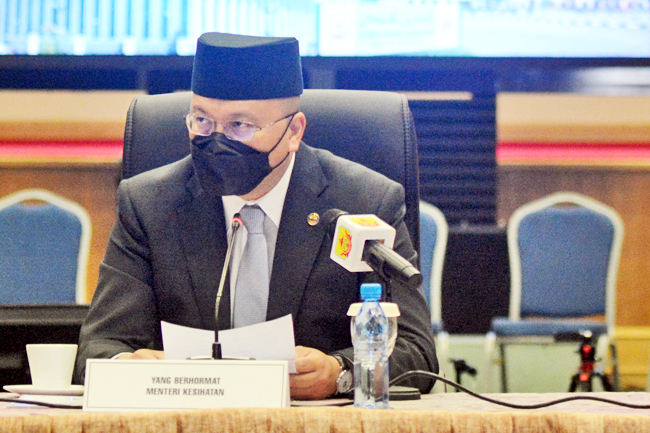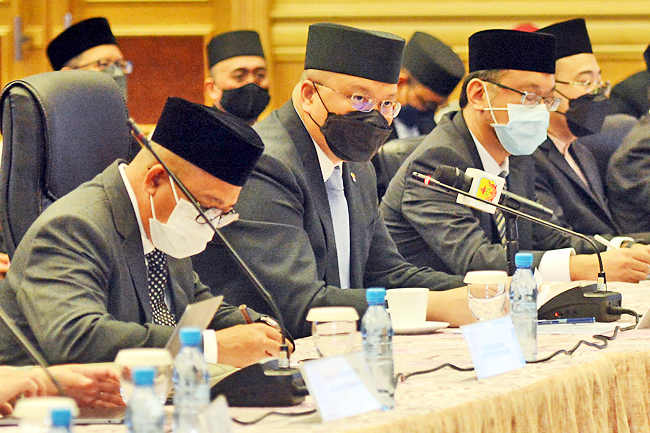James Kon
The Ministry of Health (MoH) signed a tripartite memorandum of understanding (MoU) with Jerudong Park Medical Centre and Far Eastern University of the Philippines for the establishment of a private nursing school in the Sultanate, with the hope of increasing the number of nurses, amid high demand.
This was said by Minister of Health Dato Seri Setia Dr Haji Mohd Isham bin Haji Jaafar in his speech during a Muzakarah Session between the MoH and members of the Legislative Council at Al-’Afiah Hall, MoH yesterday.
The minister said managing the COVID-19 outbreak continues to be the MoH’s main mission as the nation, as well as the rest of the world, are still tackling the pandemic.
The Sultanate’s efforts to control and monitor the COVID-19 situation will continue using the whole-of-nation approach, said Dato Seri Setia Dr Haji Mohd Isham, to ensure that available human resources, finance and infrastructure will be utilised holistically and optimally.
The minister shared that the MoH is making every effort to maintain the continuity of other important services for patients in need while keeping the outbreak under control. It includes basic healthcare such as the maternal and child health services; monitoring the risks and treatments of non-communicable diseases (NCDs) such as diabetes; checking blood pressure and cholesterol level at health centres; and conducting emergency services, for those requiring urgent surgical treatments.
“It is undeniable that the COVID-19 outbreak has posed challenges to the nation’s health system capacity. However, Alhamdulillah, thanks to the cooperation of all parties and understanding of the public through effective public relations and communications, the MoH has been able to provide these services, through the opening of an avenue that is convenient and innovative, which paves the way for tele-consultation, consolidation of services, patient self-management by allowing access to laboratory test results through digital medical records, and booking for services via digital platforms,” the minister said.


He added, “The outbreak has led to an increased use of social media and info-communications and served as a catalyst for technological development. Public acceptance of technology, has generated opportunities for the nation to advance further in the digital era in a shorter time than expected. The opportunities should be fully utilised to achieve positive changes and meet the targets of Brunei Vision 2035.
“The benefits of investment in technology should not be ignored, which include increasing employment opportunities and foreign direct investments, and more professionalism in the workforce,” said Dato Seri Setia Dr Haji Mohd Isham.
The minister also shared that several initiatives have been earmarked in response to the COVID-19 outbreak, in line with the MoH’s strategic plan and Brunei Vision 2035.
“Among the initiatives are improving clinical services, such as an increase in dialysis units for renal patients at Jerudong Park Medical Centre; transfer of the 991 call centre to Raja Isteri Pengiran Anak Saleha (RIPAS) Hospital; increasing the number of ambulances and the construction of a molecular diagnostic clinical laboratory for infectious diseases at Bukit Bendera, Tutong District, which is currently undergoing certification for level 3 biosafety in support of the MoH’s strategic objective of achieving clinical laboratory excellence to ensure public health and safety,” he said.
The country’s ability to conduct genomic sequencing to identify COVID-19 variants, the minister said, “is one of the most recent achievements, realised through collaborating with the private sector. It not only adds value to laboratory services, but also the human resource, especially in clinical laboratories”.
He added, “The MoH aspires to make the health sector a contributor to the nation’s economy. It means a resilient and dynamic health system capable of evolving towards becoming a developed and empowered sector, and creating a conducive environment for the development of a medical and health industry with professional development programmes, specialised medical services, infrastructure investment, research, medical technology and digital transformation in healthcare.”






